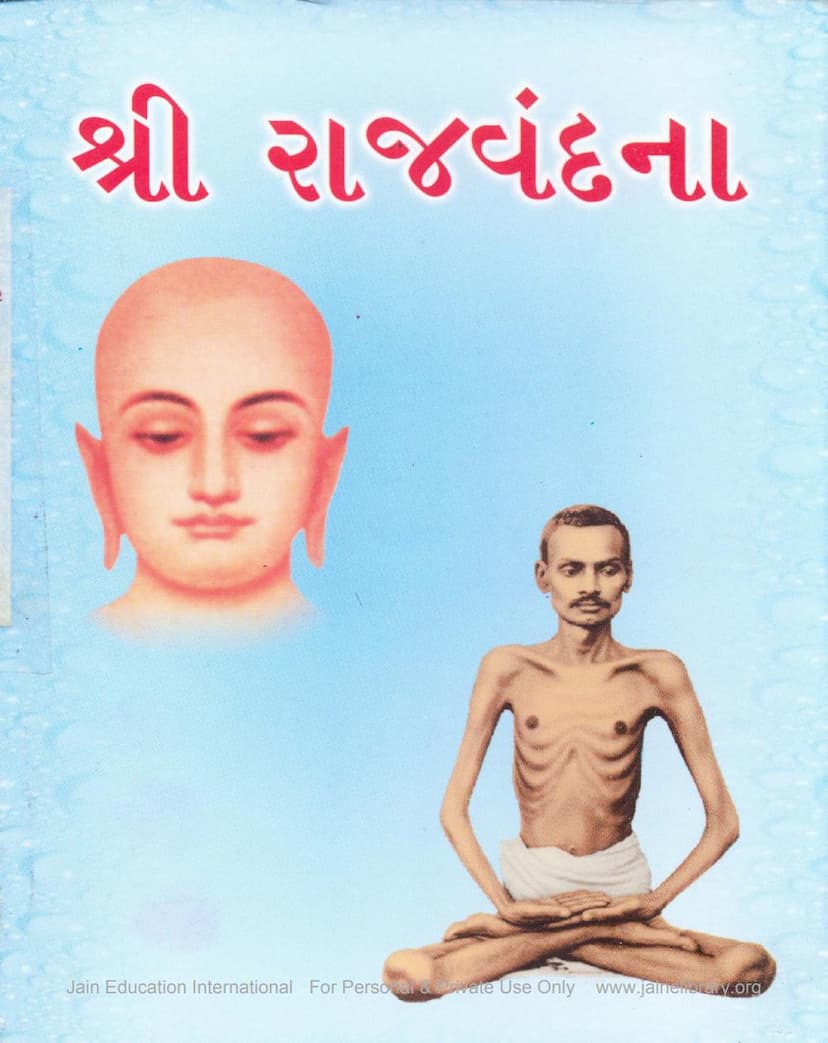Rajvandana
Added to library: September 2, 2025

Summary
Here's a comprehensive summary of the Jain text "Rajvandana," based on the provided pages:
Overall Purpose and Context:
"Rajvandana" is a Jain text published by Shrimad Rajchandra Adhyatmik Sadhna Kendra, Koba. It appears to be a collection of devotional and spiritual writings, primarily attributed to or inspired by Shrimad Rajchandraji and guided by the teachings of Saint Shri Atmanandji. The book aims to provide spiritual guidance and promote the principles of Jainism, emphasizing self-realization, devotion, and ethical conduct. The text is presented as a valuable resource for spiritual seekers, encouraging regular study and contemplation.
Key Themes and Content:
The book covers a wide range of Jain philosophy and practice, encompassing:
-
Ethical Conduct and Inner Transformation:
- Treating all beings with the same regard as oneself.
- Speaking with gentleness, love, and respect, only when necessary.
- Making the most of each moment through righteous deeds and enhancing self-awareness.
- Cultivating inner happiness through good company (Satsang), good speech (Sadavachan), good thoughts (S Vichar), and good conduct (Sadachar).
- Key virtues for spiritual attainment include faith, surrender, true knowledge, patience, perseverance, philanthropy, and divine grace.
-
Devotion to the Divine and Gurus:
- The text includes devotional verses and prayers addressed to Lord Mahavir Swami and Shrimad Rajchandraji.
- There is a strong emphasis on the importance of the Guru (Sadguru) as a guide on the spiritual path, offering pathways to knowledge and liberation.
- Various sections are dedicated to morning and evening prayers (Devvandan) and specific mantras.
-
Spiritual Teachings and Philosophy:
- "Jinvani" (The Word of the Jinas): The teachings of the Tirthankaras are highlighted as being profound, beneficial to the world, and the means to cross the ocean of existence.
- "Mokshamala Shikshapatha" (Lessons from the Path to Moksha): These sections offer profound insights into various aspects of spiritual life, including:
- Vairagya (Detachment): The futility of worldly attachments and the importance of detachment.
- Shila (Virtue/Conduct): The significance of chastity (Brahmacharya) and maintaining one's vows.
- Tṛṣṇā (Craving/Desire): The insatiable nature of desire and its detrimental effects.
- Amulya Tattva Vichar (Invaluable Principles): Contemplations on the transient nature of life, the importance of the human birth, and the quest for true happiness.
- Atmasiddhi (Self-Realization): The pursuit of understanding the true nature of the self.
- Nivritti Bodh (Teachings on Renunciation): Understanding the futility of worldly pursuits and the path of renunciation.
- Ashuchi Bhavna (Contemplation on Impurity): Reflecting on the impure nature of the body.
- Anatmavat (Non-Self): Understanding what is not the self, such as the body, senses, and worldly possessions.
- Ekatva Bhavna (Oneness): The concept of individuality and experiencing the non-duality of the self.
- Anyatva Bhavna (Otherness): Recognizing what is distinct from the self.
- Jad ane Chetanya (Inert and Conscious): Understanding the fundamental distinction between inert matter and the conscious soul.
- Panch Parameṣṭhi: Reverence for the five supreme beings (Arhat, Siddha, Acharya, Upadhyaya, Sadhu).
-
Key Sections and their Significance:
- Mangalacharan (Invocation): A devotional opening seeking blessings.
- Pady Vibhag (Poetry Section): Contains numerous devotional songs and verses covering various spiritual themes.
- Gady Vibhag (Prose Section): Includes prose writings and philosophical discussions.
- Dainik Bhakti no Nityakram (Daily Devotional Routine): Outlines a structured approach to daily spiritual practice.
- Shri Atmasiddhi Shastra ni Stuti (Praise of the Atmasiddhi Shastra): A section dedicated to praising a significant Jain scripture, likely focusing on self-realization.
- Chh Pad no Patra (Letter of Six Principles): A detailed exposition of six fundamental spiritual principles.
- Karmagati Vichitra Chhe (The workings of Karma are Wonderful): Reflections on the law of karma.
- Prarthana (Prayer): Various prayers for spiritual progress and well-being.
- Vandana Tatha Pranipata Stuti (Salutation and Reverential Praise): Expressions of deep respect and devotion.
-
The Role of the Guru:
- The text consistently highlights the indispensable role of a true Guru (Sadguru) in understanding Jain scriptures and achieving spiritual liberation. The Guru is seen as the dispeller of ignorance and the revealer of the true nature of the soul.
-
Critique of Superficial Practices:
- The book appears to caution against mere external rituals or adherence to dogma without inner understanding and transformation. True spirituality is achieved through sincere effort and genuine devotion.
Publisher's Message and Intent:
The publisher, Shrimad Rajchandra Adhyatmik Sadhna Kendra, emphasizes its tradition of offering high-quality, ethical, and spiritually beneficial literature. The publication of "Rajvandana" is dedicated to Lord Mahavir Swami and Shrimad Rajchandraji, marking significant anniversaries. The Kendra expresses a heartfelt wish that the booklet will be immensely beneficial to all, fostering the growth of virtuous qualities and leading to self-knowledge through repeated study. The second edition notes the inclusion of many poems by Shrimad Rajchandraji and prayers.
Overall Tone and Impact:
"Rajvandana" is a deeply devotional and instructive book. It aims to guide individuals on their spiritual journey by providing practical advice, philosophical insights, and inspiring verses. The emphasis on inner transformation, ethical living, and the grace of the Guru suggests a path of devotion combined with knowledge and right conduct, central to Jain spiritual traditions. The recurring sentiment is one of earnest seeking and aspiration for ultimate spiritual freedom.